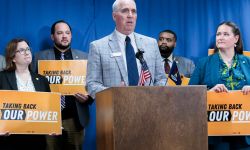As September looms, no Republican proposal yet to fix Michigan’s roads

A roads deal between GOP House and Senate leaders and Democratic Gov. Gretchen Whitmer could be announced in as soon as two weeks, according to Michigan’s Senate leader.
In a radio interview on WJR-AM in Detroit, Senate Majority Leader Mike Shirkey said he is confident that by late August he, Republican House Speaker Lee Chatfield and Whitmer will be ready to jointly share “the general direction” of a roads proposal, “and then we’ll turn our teams loose to put the details in.”
He would not share details of the framework that’s being discussed in the radio interview on Detroit’s WJR-AM, but he disclosed differences between the two GOP leaders over the need to raise new revenue to fund a more than $2 billion hike in annual road repairs. Shirkey said he acknowledges the need for additional funds (i.e., taxes) while Chatfield wants to divert money from other parts of the state budget, Shirkey said.
Shirkey also praised the Democratic governor’s openness to compromise, saying Whitmer “is evaluating ‒ honestly evaluating ‒ many of the alternatives that we placed on the table.”
More Michigan roads stories:
- Aug. 21: Pressure builds on Michigan Republicans for roads plan to avoid shutdown
- Republican ideas to fund Michigan road repairs taking shape over summer
- Pressure builds on Michigan Republicans to share their road funding plan
- Michigan House GOP plans to replace sales tax on gasoline to fund roads
- See how much a 45-cent Michigan gas tax might cost you
A Whitmer spokeswoman declined to comment Thursday on whether two weeks is feasible to hammer out a road-funding compromise, which hinges in large part on the amount and sources of new revenue. Whitmer herself said in an interview with reporters this week that the three leaders aren’t yet negotiating, but added that she thought more details could come within a matter of weeks.
“We have conversations, but there’s no negotiations. They’ve not shared a plan,” Whitmer told reporters this week about her talks with Chatfield and Shirkey.
The three met last Friday. Shirkey said in the radio interview that they planned to meet again this week.
“I’ve read pieces of things that are being debated amongst themselves, but at the end of the day, they’re going to need Democratic votes in the House, the Senate and my signature to have a budget done,” Whitmer said. “And that’s why we’ve got to get serious about negotiating.”
Details about what Shirkey and Chatfield intend to propose as a counter to Whitmer’s proposed 45-cent-per-gallon gas tax increase have been kept mostly under wraps throughout the summer. The leaders have not yet briefed rank-and-file Republican legislators.
“I’m sure eventually we will be briefed in caucus on what has been discussed, but as of right now, there’s no set time for that,” said Rep. Jack O’Malley, R-Lake Ann and chairman of the House transportation policy committee. “I believe that’s one reason why we’re coming back in late August.”
When lawmakers return to Lansing the week of Aug. 26, they’ll have about five weeks to approve a budget for the 2020 fiscal year that starts Oct. 1, or risk shutting down state government. Funding for roads ‒ both the amount needed and the source of the money ‒ has been a roadblock to finishing the budget.
Shirkey, R-Clarklake, and Chatfield, R-Levering, previously said they aren’t working on a deadline to complete their road-funding proposal, which experts agree will need to cost the state more than $2 billion annually.
Shirkey said in the radio interview any compromise will not include Whitmer’s gas-tax proposal. He has said any new revenue for roads should come after the state prioritizes existing state spending on roads. He told WJR he believed state lawmakers could find “north of a billion” in the existing state budget to divert to roads, but that new revenue also will be needed ‒ a position that he said differs from Chatfield’s.
Chatfield “is pressing hard ‒ appropriately pressing hard ‒ to see if we can’t test ourselves to get there without [new revenue],” Shirkey told WJR. “The kinds of cuts necessary to do that are painful across the board.”
Gideon D’Assandro, a spokesman for Chatfield, confirmed to Bridge “the speaker wants to make sure existing funds are being used wisely by the government first before asking Michigan families to pay more, that’s been a priority of his and the House Republican caucus for a few years now. And it is simply the right thing to do.”
D’Assandro was scant on details surrounding negotiations and said there is “no firm timeline” on when a compromise would be publicly released.
Shirkey told WJR he envisions the rollout of a roads plan to be similar to how a deal with Whitmer to reform Michigan’s no-fault auto insurance law was announced in May. Auto insurance talks were kept behind closed doors for weeks before Shirkey, Chatfield and Whitmer jointly unveiled their compromise to reporters.
“There’s obviously a plan that’s coming together, pieces of a plan that’s coming together, but right now it’s not together,” said Rep. Triston Cole, R-Mancelona, who sits on the House transportation policy committee.
Experts have said Michigan needs to spend an estimated $2.5 billion more per year to get most of the state’s deteriorating roads into good or fair condition. That’s on top of $1.2 billion that was generated in 2015 through a gas tax increase, higher registration fees and diverted state income tax revenue, an amount experts have panned as insufficient to fix all of Michigan’s bad roads.
Whitmer, a first-term governor, staked her campaign on a pledge to “fix the damn roads.” She proposed $2.5 billion in new road funding in March, anchored by the gas tax hike that the GOP-controlled Legislature quickly rejected. Several statewide business groups and regional chambers of commerce have publicly advocated for new revenue, to the tune of $2.5 billion, and urged legislators to take action.
Republicans say Michigan taxpayers can’t afford to pay 45 cents more on gasoline. Chatfield has said his priority is to remove the sales tax paid on gasoline, since the revenue it generates pays for schools, rather than roads, and replace it with an equivalent amount of state gas tax, which does fund roads.
Shirkey and Chatfield also are considering a proposal from the West Michigan Policy Forum, a group of influential Grand Rapids-area business leaders, to issue bonds to shore up Michigan’s underfunded teacher pension system and stretch payments out over more years to lower the amount paid annually. That essentially would free up money for K-12 schools to offset the lost sales tax revenue from the gas pump.
Whitmer hasn’t endorsed the pension bond idea, citing the long-term effects of delaying pension payments on the state’s ability to pay out the obligated benefits to retirees.
Additionally, some Republican legislators, including O’Malley, want the final roads plan to incorporate ideas that came out of committee hearings this spring, including allowing counties and cities to levy their own local gas taxes.
Republicans in the House and Senate cut spending from multiple departments in their proposed 2020 budgets, in part to free up money for roads. Some Republicans also have questioned whether the $2.5 billion Whitmer’s administration is seeking should include the $1.2 billion approved four years ago, rather than come in addition to it.
Whitmer, meanwhile, wants lawmakers to cast one vote for a budget that would provide more funding for roads, schools and other services, and includes revenue from a gas-tax increase.
The Republican-majority Legislature and Whitmer have to hammer out a budget deal for 2020 by Sept. 30, or face a shutdown of government services. Whitmer told reporters this week that she’s open to asking legislators to pass a continuation budget extending temporarily into the new year if it appears that a deal isn’t likely to materialize by mid-September.
“Everyone has said they don’t want to get close to a shutdown,” she said. “If that’s the case and we have good-faith negotiations but we’re not able to get things done in time, I’m confident we’ll [look at a continuation].”
Shirkey told WJR the government will not shut down.
“I think she’s been an honest broker,” Shirkey said of Whitmer. “She’s passionate about what my governor wants to accomplish, but she’s also demonstrated to me, at least, that she’s pragmatic and she knows that we have to work together.
“It always involves a bit of give-and-take, and maybe even a little bit of contention, as you work up to a point at which everybody then says, ‘OK, this is a deal that we can get done.’”
See what new members are saying about why they donated to Bridge Michigan:
- “In order for this information to be accurate and unbiased it must be underwritten by its readers, not by special interests.” - Larry S.
- “Not many other media sources report on the topics Bridge does.” - Susan B.
- “Your journalism is outstanding and rare these days.” - Mark S.
If you want to ensure the future of nonpartisan, nonprofit Michigan journalism, please become a member today. You, too, will be asked why you donated and maybe we'll feature your quote next time!




